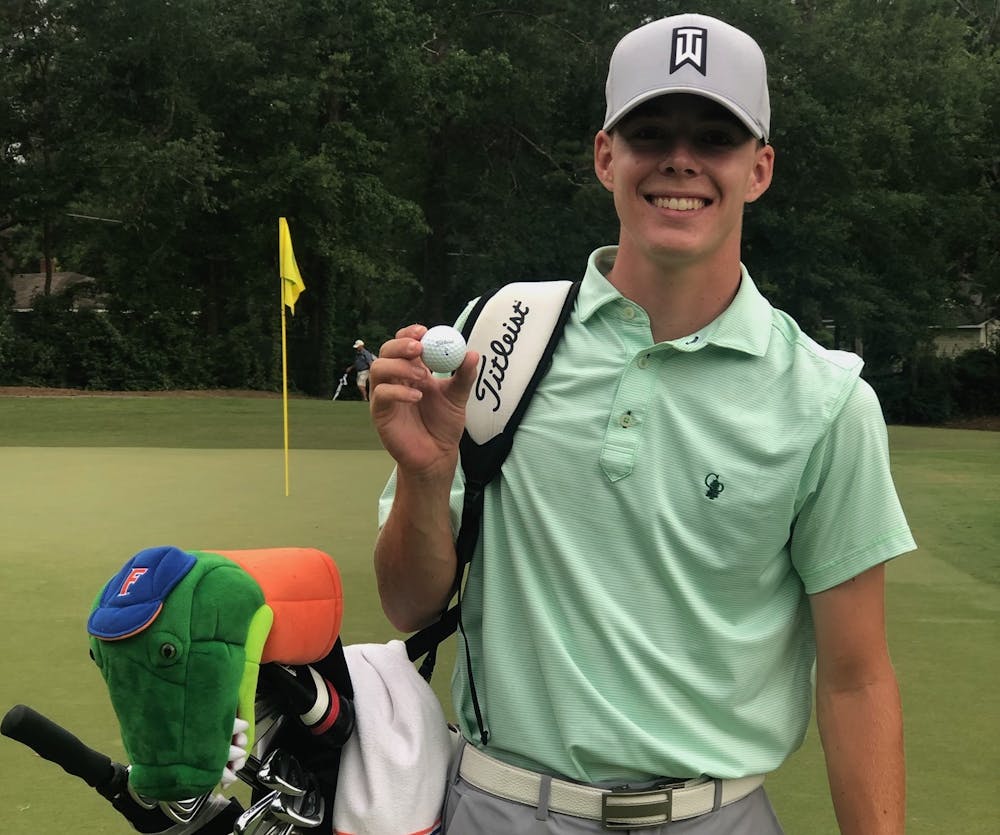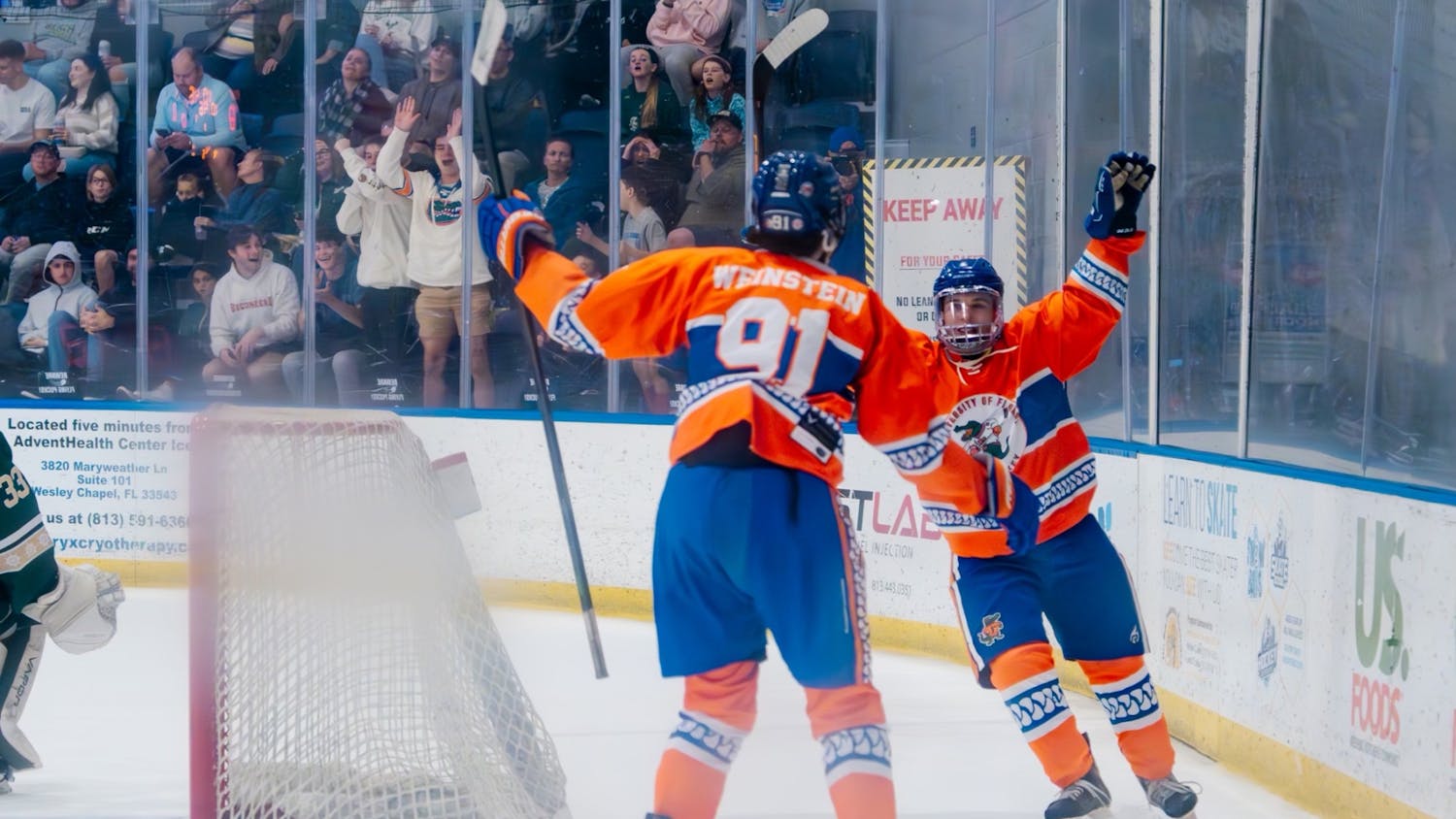Ryan Hart was always small.
Whether on the hockey rink, soccer field, baseball diamond or golf course, he was always a diminutive presence. But his height never deterred him from competing.
He was once a 4-foot-11-inch middle school hockey player. Now, the blonde-haired Ryan is 5 feet, 8 inches tall and entering his freshman spring on the Florida men’s golf team. He didn’t start playing golf competitively until he was 13.
Ryan, 19, was raised in Buffalo, New York, and fell in love with hockey at a young age. His father, Dudley, let Ryan explore whatever sport he wanted.

He wanted Ryan to experience everything, so he could choose what he wanted for himself. But as a professional golf player, Dudley always hoped his son would get into the sport.
Despite this, Dudley believes experimenting with sports made Ryan a better athlete, overall.
If anyone knows what it takes to succeed at golf, it’s Dudley. He played golf at UF and was a two-time tournament winner on the PGA Tour. He now plays on the PGA Champions Tour.
Growing up north, Ryan became interested in hockey at a young age. When Ryan started playing, Dudley reached out to one of his good friends, current New Jersey Devils head coach Lindy Ruff. Then with the Buffalo Sabres, Ruff told Dudley to take Ryan to every skating clinic he could so that he would be a technically sound skater.
Through practice, Ryan overcame his main shortcoming: his size. Instead of bulldozing defenders like a running back, he could weave through them like a wide receiver.
“I wasn’t bad,” Ryan said. “I was small and fast. I wasn’t good enough to play in college. I was too small, probably just above average.”
While skate skills worked for a while, they could only take him so far before size became a glaring weakness in his game.
“His size kind of hurt him a little bit in hockey,” Dudley said. “He was just a little kid, and he didn't have a hard shot.”
Ryan didn’t seriously start golfing until eighth grade when his family moved to Florida. Before the move, Ryan only golfed during the summer, as the colder-than-Hoth winters of Buffalo weren’t ideal for hitting the links. The move to the Sunshine State shifted him away from hockey to golf.
“I’d be lying if I said down deep I didn’t hope he got into it at some degree,” Dudley said.
Dudley never expected his son to play at his alma mater, but he was ecstatic when Ryan decided to pursue golf, saying it was originally more about being able to play golf with his son when Dudley got older.
While Dudley was happy for his son, he was also concerned because he lived through the sport’s pitfalls.
“In golf, you can’t hide,” Dudley said. “Your score is your score. And when you’re struggling, the world sees you struggling.”
In the golf world, Ryan is a late bloomer because he didn’t compete until high school.
While the delayed start put him behind the eight ball, Ryan’s work ethic transferred from the rink to the links, and his hand-eye coordination carried over as well.
Gators head coach J.C. Deacon believes having fast-twitch muscles from taking slap shots translated directly to Ryan’s golf swing. Paired with his natural motion and rock-solid tempo, Ryan has a beautiful yet swing and averages nearly 300 yards per drive.
His athleticism also caught Deacon’s eye through his relationship with Dudley. Some of the strongest parts of Ryan’s game, including his driving distance, are tied to his hockey background, Deacon said.
While his physical skill is impressive, Ryan’s mental prowess may overshadow that. Golf is an emotional game, and it takes a lot of mental fortitude to succeed.
“He's a tough, tough guy for his size and his age, and I think that that's kind of a hockey mentality, too,” Deacon said.
As a former professional himself, Dudley knows how demoralizing it can be to work hard on his game and still come up short. It takes more than physical skill to succeed at the collegiate and professional levels — it takes a level of determination and commitment that an athlete has to be “a little messed up in the head” to have, Dudley said.
“If you really want to be good at golf at a high competitive level, you almost have to embrace getting kicked in the privates,” Dudley said. “Because golf kicks you in the privates a lot.”
Deacon saw Ryan develop first hand from a young age. The Florida coach has seen Ryan develop as a golfer since he was 14, and said he has always had a great swing. Ryan’s short game was the main thing that first drew Deacon’s interest. Dudley met Deacon after he took over Florida’s program in 2014. One of Deacon’s main goals was to get alumni more involved, including players like Chris Dimarco, Billy Horchel and the Chairman of Augusta National Golf Club Fred Ridley.
Connecting these Gator greats with the current roster would further their development, Deacon said. Dudley was more than happy to help and offered coaching tips and advice whenever he could.
Ryan grew up playing Colusa Pines in Naples, which Deacon describes as a severe, firm and fast golf course.
“It forces you to learn on the necessary shots,” Deacon said. “You need to have a great short game, and he’s done that.”
A lot of Ryan’s short-game skills can be credited to Dudley. Being around a professional golfer all the time, Ryan was bound to pick up a few things. Ryan learned delicate short-game shots, specifically shots around the green, that he wouldn’t have had access to otherwise.
Ryan had only received minor interest from other SEC schools when he received an offer to Florida his junior year of high school. But Deacon saw his potential and pulled the trigger.
“The kid bleeds orange and blue, and we need that,” Deacon said. “That really does rub off on his teammates, and it rubs off on me.”
Ryan’s hard work is starting to pay off. He beat his father for the first time this summer at Aronimink Golf Club in Pennsylvania. Aronimink, designed by iconic golf course designer Donald Ross, puts even the best golfers to the test. It’s more than 7,200 yards long and houses a combination of long par-5s and shorter par-4s that require more precision.
Ryan has been physically better than his father for a while, Dudley said. He credited his wins to how he could beat Ryan mentally and get in his head like a trash-talking cornerback on Sundays.
“I have a way of maybe not playing fair sometimes, mentally with Ryan,” Dudley said. “My father did it to me, and I hated it when he did it, but it made me mentally stronger down the road.”
When Ryan finally took his old man down, Dudley wasn’t upset. In fact, he said he couldn’t wait for the day that he would — but Ryan was going to have to earn it.
“I want him to be way better than I ever was,” Dudley said. “I mean, we all want something better for our kids than we had.”
Ryan wasn’t handed anything in golf. He came a long way from being an undersized winger in Buffalo. Now, he’s out trying to prove himself at the collegiate level, just like he did at every stop before.
Contact Michael Hull at mhull@alligator.org and follow him on Twitter @Michael_Hull33
Michael Hull is a fourth-year journalism sports & media major and a sports writer at The Alligator. He hosts the weekly sports podcast and has worked on staff for five semesters. In the past, Hull has served as the sports editor, the men's and women's golf beat writer, the volleyball beat writer and the football beat writer.




